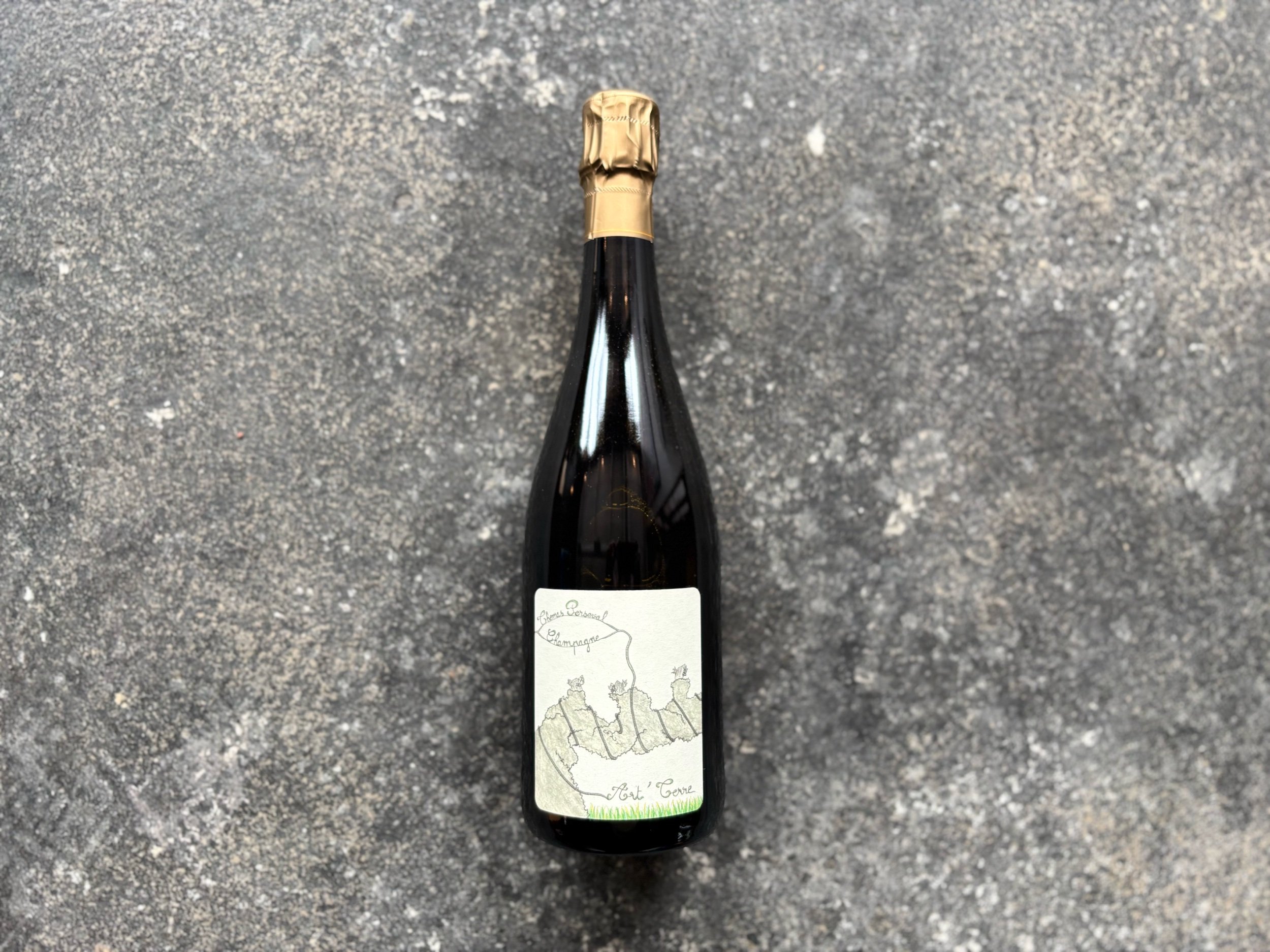Champagne Thomas Perseval ‘Art’ Terre’ Brut Nature Blanc NV
Location: France, Champagne, Montagne de Reims
Winemaker: Thomas Perseval
Grapes: Pinot Noir, Pinot Meunier, Chardonnay
Tirage: 2022
Disgorged: Feb 2024
From the Importer Selection Massale:
Thomas Perseval’s grandparents created this domaine in Chamery as a co-op, and his parents began to make their own, estate-bottled wines in the 1980s. Thomas returned to the domaine in the 2000s after winemaking school, with the goal of changing things, starting in the vines. In 2009 he began to convert to organic viticulture, and was certified organic as of the 2012 vintage. Presently Thomas disgorges both his parent’s wines and his own wines, but labels them separately in order to make a distinction between those that are made from organic grapes, and those that are not. He also changed the regime in the cellar, incorporating (in his own words) a more “laissez faire” philosophy. Thomas, like many of our other favorite young Champenois, is part of a region-wide movement to make more terroir-driven, vineyard-forward wine in Champagne by working organically in the vines, eliminating cultured yeast whenever possible for the vins clairs, incorporating less reductive processes in the cellar, and lowering dosage to highlight ripe, well-tended fruit. He’s also a really nice guy.
Thomas’ 2.5 hectares of vines (divided amongst five parcels) are in and around the town of Chamery, in the northwestern part of the Montagne de Reims, a 30-minute drive west of the city. The soils are clay, sand, and “calcaire limoneux.” He uses copper in the vines, and tries to reduce the amount every year. The oldest vines at the domaine were planted in the 1970s during his grandparent’s time.
Location: France, Champagne, Montagne de Reims
Winemaker: Thomas Perseval
Grapes: Pinot Noir, Pinot Meunier, Chardonnay
Tirage: 2022
Disgorged: Feb 2024
From the Importer Selection Massale:
Thomas Perseval’s grandparents created this domaine in Chamery as a co-op, and his parents began to make their own, estate-bottled wines in the 1980s. Thomas returned to the domaine in the 2000s after winemaking school, with the goal of changing things, starting in the vines. In 2009 he began to convert to organic viticulture, and was certified organic as of the 2012 vintage. Presently Thomas disgorges both his parent’s wines and his own wines, but labels them separately in order to make a distinction between those that are made from organic grapes, and those that are not. He also changed the regime in the cellar, incorporating (in his own words) a more “laissez faire” philosophy. Thomas, like many of our other favorite young Champenois, is part of a region-wide movement to make more terroir-driven, vineyard-forward wine in Champagne by working organically in the vines, eliminating cultured yeast whenever possible for the vins clairs, incorporating less reductive processes in the cellar, and lowering dosage to highlight ripe, well-tended fruit. He’s also a really nice guy.
Thomas’ 2.5 hectares of vines (divided amongst five parcels) are in and around the town of Chamery, in the northwestern part of the Montagne de Reims, a 30-minute drive west of the city. The soils are clay, sand, and “calcaire limoneux.” He uses copper in the vines, and tries to reduce the amount every year. The oldest vines at the domaine were planted in the 1970s during his grandparent’s time.
Location: France, Champagne, Montagne de Reims
Winemaker: Thomas Perseval
Grapes: Pinot Noir, Pinot Meunier, Chardonnay
Tirage: 2022
Disgorged: Feb 2024
From the Importer Selection Massale:
Thomas Perseval’s grandparents created this domaine in Chamery as a co-op, and his parents began to make their own, estate-bottled wines in the 1980s. Thomas returned to the domaine in the 2000s after winemaking school, with the goal of changing things, starting in the vines. In 2009 he began to convert to organic viticulture, and was certified organic as of the 2012 vintage. Presently Thomas disgorges both his parent’s wines and his own wines, but labels them separately in order to make a distinction between those that are made from organic grapes, and those that are not. He also changed the regime in the cellar, incorporating (in his own words) a more “laissez faire” philosophy. Thomas, like many of our other favorite young Champenois, is part of a region-wide movement to make more terroir-driven, vineyard-forward wine in Champagne by working organically in the vines, eliminating cultured yeast whenever possible for the vins clairs, incorporating less reductive processes in the cellar, and lowering dosage to highlight ripe, well-tended fruit. He’s also a really nice guy.
Thomas’ 2.5 hectares of vines (divided amongst five parcels) are in and around the town of Chamery, in the northwestern part of the Montagne de Reims, a 30-minute drive west of the city. The soils are clay, sand, and “calcaire limoneux.” He uses copper in the vines, and tries to reduce the amount every year. The oldest vines at the domaine were planted in the 1970s during his grandparent’s time.

